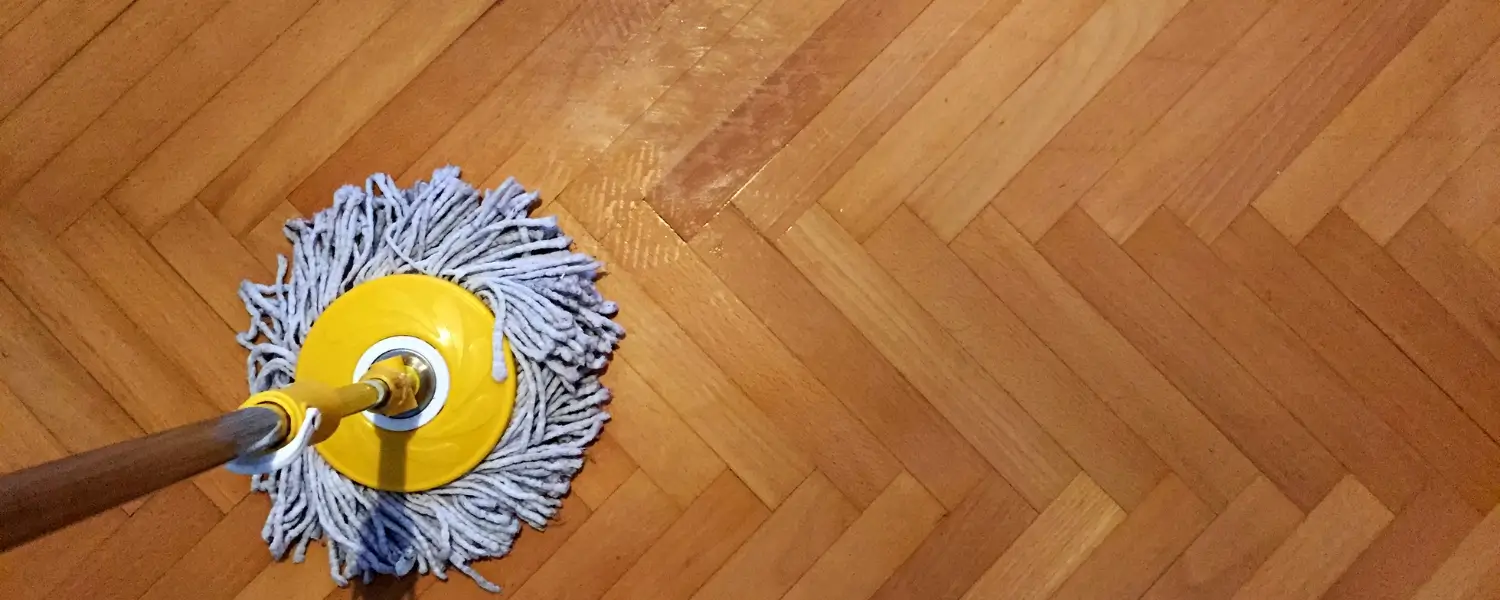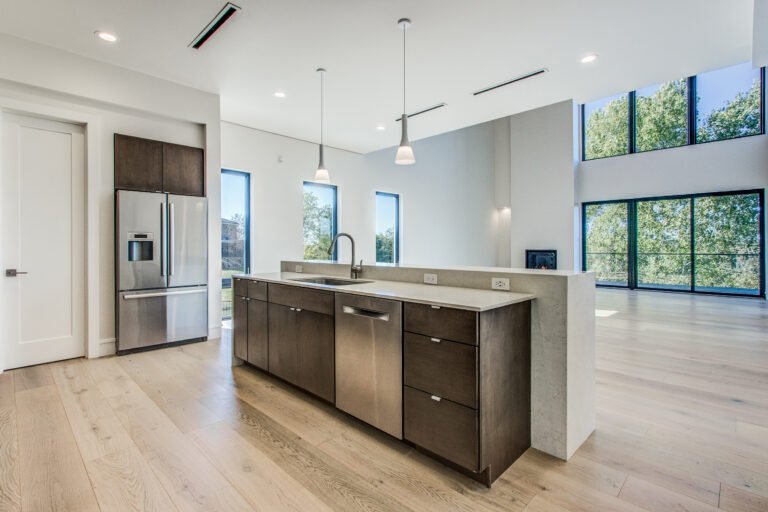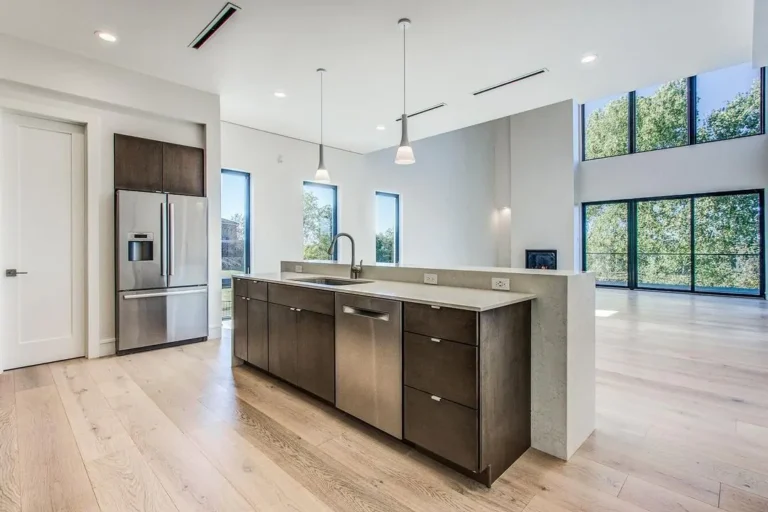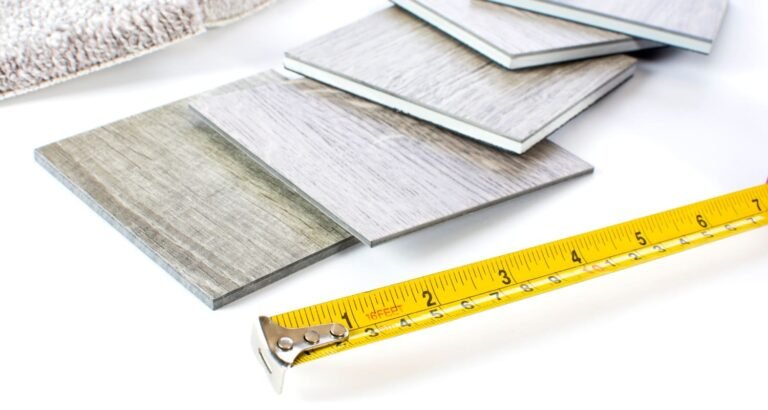How to Deep Clean Hardwood Floors: Your Ultimate Guide to Flawless Floors
Do your engineered hardwood floors look dull despite regular cleaning? Wondering how to deep clean hardwood floors and bring back their shine? Hardwood floors bring elegance and warmth to any home, but dirt, grime, and stains can build up over time. Don’t worry – we’ve got you covered. Our comprehensive guide reveals the secrets to deep cleaning your hardwood floors so they stay stunning for years. So, let’s dig in and discover the secrets to achieving flawless hardwood floors!
Why Deep Cleaning is Important?
Deep cleaning isn’t just about aesthetics; it’s essential for preserving your hardwood’s lifespan. Dirt, grime, and pollutants can dull your floors and cause damage. While regular cleaning helps, a deep clean is like a spa treatment for your floors, restoring their luster and protecting their beauty.

Understanding Hardwood Floors
Solid Hardwood vs. Engineered Hardwood
Before you start cleaning, you must know what kind of hardwood you have. Solid hardwood is one piece of wood, while engineered hardwood has multiple layers. It affects how you clean them. Solid hardwood can be sanded and refinished, while engineered hardwood is more resistant to moisture but has a thinner wear layer.
Learn the difference between these option in detail in our other blog, “Engineered Hardwood Vs Hardwood“
Different Finishes and Their Cleaning Requirements
Your hardwood’s finish also matters. Polyurethane is tough and handles water-based cleaners well. Oil-based finishes are more delicate and need gentle cleaners. Wax finishes require periodic buffing to keep their shine. Knowing your finish helps you choose the right cleaning products.
Essential Tools and Materials
Maintaining pristine hardwood floors requires using the right tools and materials. From specialized cleaning tools to suitable cleaning solutions, having the correct equipment helps keep your floor clean.
Tools for Deep Cleaning
When deep cleaning hardwood floors, having the right tools is essential for achieving optimal results. Proper tools ensure the effective removal of dirt and grime without causing any damage. Here are some basic tools you should consider for deep cleaning your hardwood floors:
- High-quality microfiber mop: Traps dirt without scratching.
- Vacuum cleaner: Gets into hard-to-reach areas.
- Broom with soft bristles: Gently sweeps away debris.
- Putty knife: Scrapes off stubborn gunk.
Cleaning Solutions
Discover effective options for cleaning hardwood floors, including eco-friendly solutions and convenient commercial cleaners with added benefits.
- Eco-friendly options: Vinegar, lemon juice, and olive oil are natural and effective choices for cleaning hardwood floors. They remove dirt and stains without harmful chemicals.
- Commercial hardwood floor cleaners: Convenient and often include extras like UV protection or scratch resistance
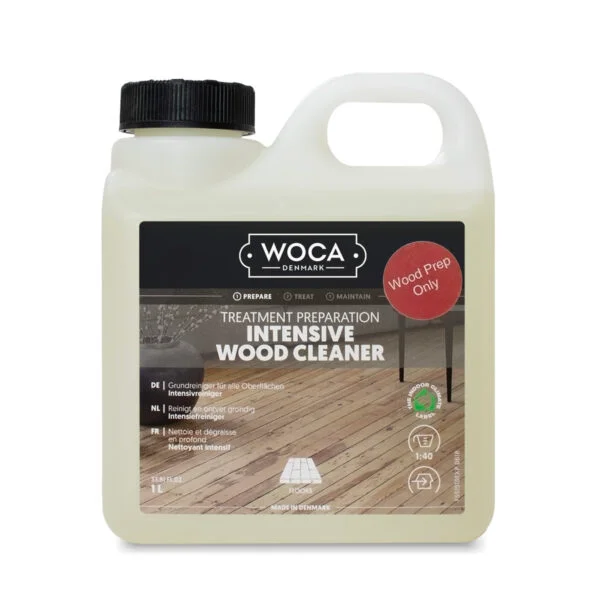
Natural Cleaning Solutions vs Readymade Cleaning Solution
Selecting the right cleaning solution is crucial. Different types of hardwood require specific care to ensure they remain in excellent condition. You can find two kinds of cleaning agents: natural and readymade. The following table clearly explains the difference between them:
| Feature | Natural Cleaners | Readymade Cleaners |
| Ingredients | Vinegar, lemon juice, etc. | Formulated for hardwood |
| Gentleness | High | Moderate to High |
| Cost | Low | Moderate to High |
| Convenience | Requires mixing | Ready to use |
Step-by-Step Deep Cleaning Process
Clean your hardwood floors effectively without causing damage by following a systematic approach. Follow this step-by-step process:
Preparing the Floor
Prepare the floor by removing furniture and obstacles. Sweep or vacuum to remove loose dirt and debris. This initial preparation sets the stage for effective deep cleaning, eliminating embedded dirt without spreading more contaminants.
Cleaning Techniques
After floor preparation, you can proceed with the deep cleaning using the appropriate techniques.
Spot cleaning:
- Address stains and spills promptly.
- Gently scrub the affected area with a soft cloth or sponge dampened with a hardwood cleaning solution.
- Avoid abrasive materials to prevent scratching or damaging the floor’s finish.
Mopping:
- After spot cleaning, use a microfiber mop dampened with your chosen cleaning solution.
- Mop in small sections, following the wood grain to lift and remove dirt effectively.
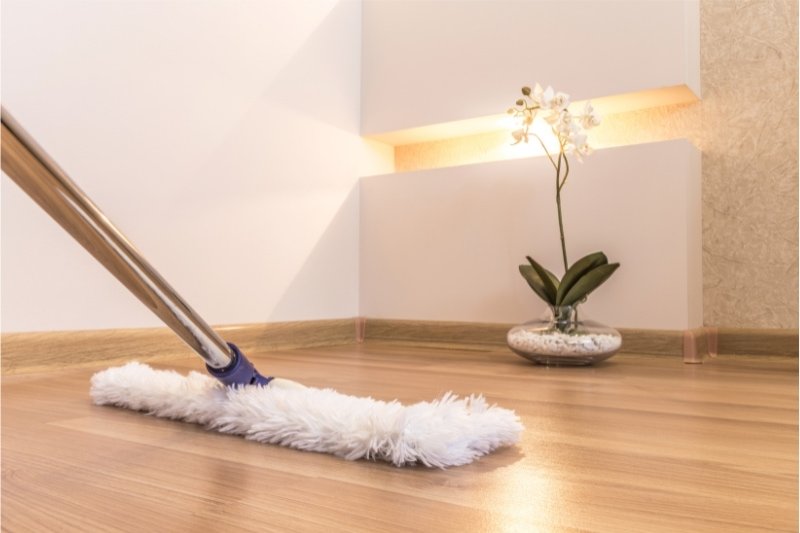
Drying (Air Drying)
Proper drying is crucial to prevent water damage and maintain the appearance of your hardwood floors.
- Let the floor dry completely before walking or putting the furniture back.
- Open windows and doors to enhance air circulation and speed up drying.
Fix Scratches
To fix minor scratches on hardwood floors:
- Use a matching wood filler or wax stick.
- Apply the filler or wax to the scratch.
- Smooth it with a putty knife.
- Let it dry, then sand and apply a finishing coat.
Sanding
Proper sanding is crucial for a smooth and long-lasting finish.
- Start with coarser grit sandpaper (e.g., 36-60 grit) for deep scratches and finish with finer grits (e.g., 100-120 grit) for a smooth surface.
- A floor buffer with a sanding screen can be easier for large areas than an orbital sander.
- Vacuum thoroughly after sanding to remove all dust before applying finishes.
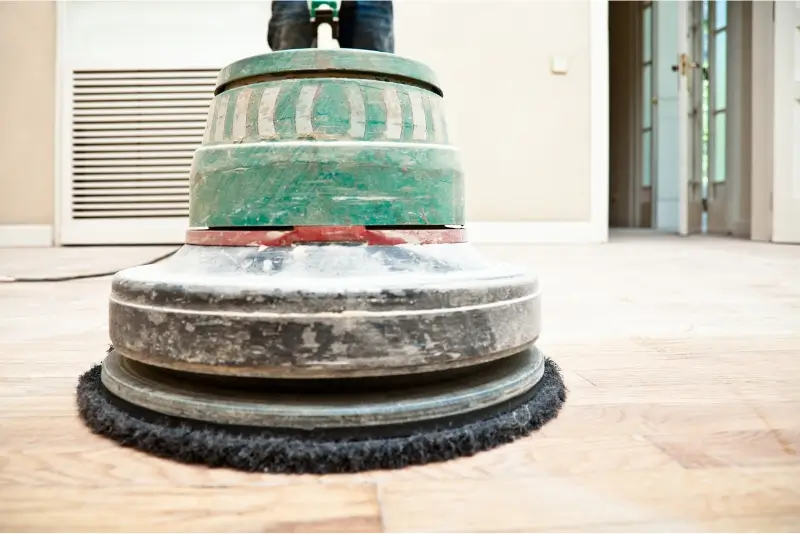
Apply Finishing Coats
Finishing coats provide protection and enhance the beauty of your hardwood floors.
- Ensure the floor is thoroughly clean and dry before applying finishes.
- Consider using a wood floor sealer or base coat first, then applying 2-3 coats of the final finish.
- Allow proper drying time between coats as specified on the product.
- Choose a finish based on traffic levels – polyurethane is highly durable for high traffic.
- Follow the manufacturer’s instructions for optimal results and long-lasting beauty.
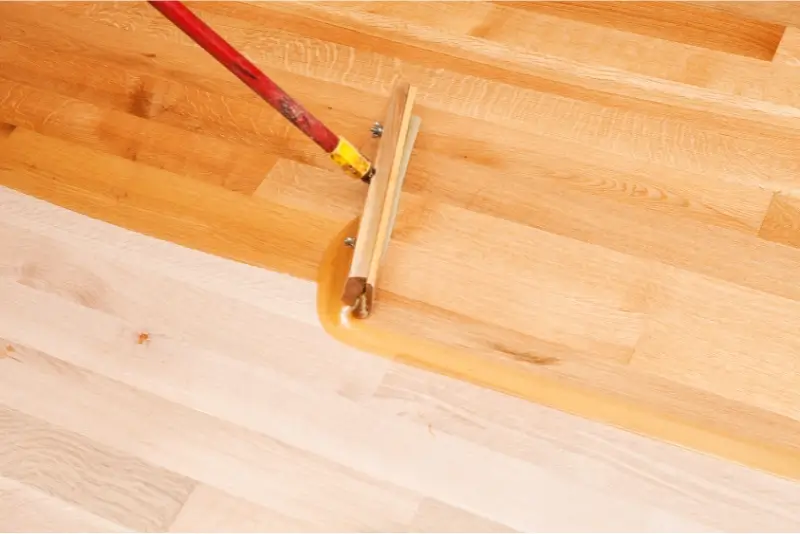
Deep Cleaning vs Regular Cleaning
| Feature | Deep Cleaning | Regular Cleaning |
| Purpose | Removes embedded dirt and grime | Surface dirt and spills |
| Frequency | Once or twice a year | Daily or weekly |
| Tools | Specialized mop, soft brush | Broom, vacuum, damp mop |
| Effectiveness | Restores shine and luster | Maintains cleanliness |
Tips for Long-Lasting Beauty
Keeping your hardwood floors clean and looking great is important for making your home feel welcoming. Simple routines and steps make maintaining clean and beautiful hardwood floors easy. Follow these tips for long-lasting beauty and a welcoming home:
Regular Maintenance Routine
To keep your hardwood floors in pristine condition, follow this regular maintenance routine:
- Dust Busting: Regularly sweep or vacuum to remove dust and grit that can scratch floors.
- Damp Mopping: Damp mop with a mild cleaner weekly, avoiding excess water.
- Spot Cleaning: Promptly wipe up spills and treat stains to prevent setting.
Preventative Measures
Protecting your hardwood floors is essential for their longevity. Implement these measures to prevent damage and extend their lifespan:
- Use furniture pads: Place pads under furniture legs to prevent scratches and dents.
- Area Rugs: Use rugs in high-traffic areas and entryways to reduce wear and tear.
- Control Humidity: Maintain indoor humidity between 35-55% to prevent cracks and warping.
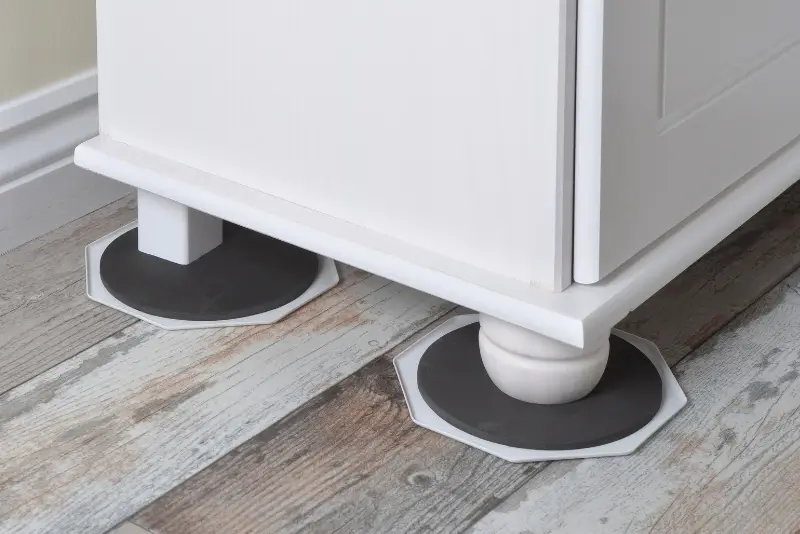
Common Mistakes to Avoid
To keep your hardwood floors looking great, avoid these common mistakes that can damage or degrade their appearance. By steering clear of these pitfalls, you’ll preserve the beauty and durability of your floors for years to come.
Choosing the Wrong Cleaning Agents
Using the wrong cleaning agents on your hardwood floors can have severe consequences. Harsh chemicals, abrasive cleaners, and oil-based products can strip away the floor’s finish, causing discoloration, warping, or damage. Use gentle, pH-neutral cleaners specifically for hardwood floors.
Not Following Manufacturer Guidelines
Each hardwood floor comes with the manufacturer’s care instructions. Ignoring these instructions can void warranties or damage the floor. Always follow their recommendations for cleaning solutions, maintenance routines, and preventive measures.
Benefits of Professional Hardwood Floor Cleaning
While regular maintenance is crucial, professional cleaning services offer advantages. Here’s why professional care is beneficial:
Why Experts Offer Superior Care
Professionals have the knowledge, tools, and techniques for superior hardwood floor care. They use specialized solutions and equipment, ensuring thorough cleaning without damage. Their expertise allows them to identify and fix issues like deep stains or water damage.
When to Hire Professional Hardwood Floor Cleaners
Hire professionals when regular maintenance isn’t enough. Consider them for deep cleaning accumulated dirt, grime, or stubborn stains that regular cleaning can’t remove. They can also restore older, neglected floors by refinishing or other restoration services.
How to Deal with Water Damage?
Water damage can harm hardwood floors’ appearance and structure. Act promptly to prevent further harm. Here’s what you can do:
- Immediately clean up water pooling or spills with towels or a wet/dry vacuum.
- Use fans, dehumidifiers, and open windows and doors to dry the affected area thoroughly.
- Once dry, inspect for signs of warping, cupping, or discoloration. Consult professionals for extensive damage.
- Prevent future issues by avoiding potted plants on floors, using furniture mats, and promptly cleaning spills.
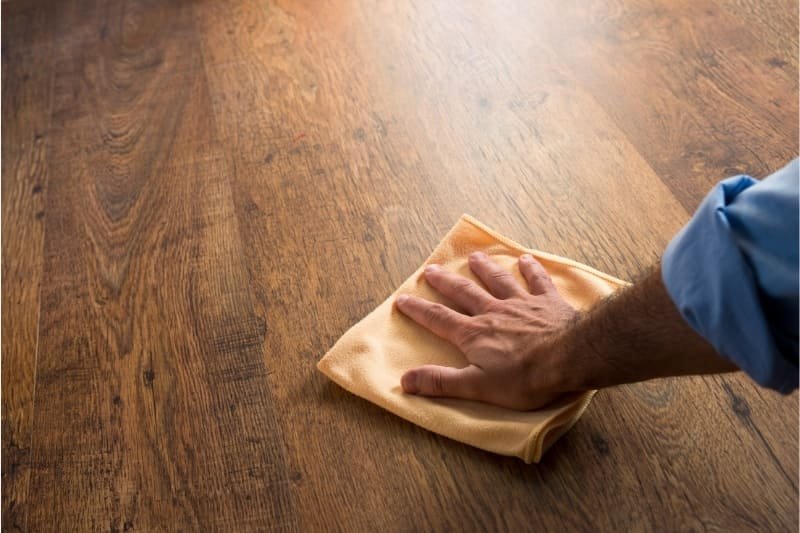
Upgrade Your Flooring with Villagio Wood Floors
Regular maintenance and deep cleaning are essential for preserving the beauty and longevity of hardwood floors. Understanding your floor type and finish and using proper cleaning techniques significantly improve the appearance and structural integrity. Select hardwood-safe cleaning solutions and follow preventive measures like humidity control to protect your hardwood floor investment for years.
Upgrade to Villagio Wood Floors‘ premium engineered hardwood if your floors are beyond repair or cleaning can’t restore their luster. We are a trusted California company offering durable, elegant options that combine style and durability. Our quality flooring solutions enhance any space. Explore our engineered wood flooring options today!
How to Deep Clean Hardwood Floors – FAQs
How often should I deep clean my hardwood floors?
Deep clean hardwood floors once or twice yearly. The frequency depends on foot traffic, pets, and conditions. Clean more often for heavily used or visibly dirty floors.
Can I use vinegar to clean my hardwood floors?
Yes! You can use vinegar to clean your hardwood floors effectively. Mix one part of vinegar with ten parts of water for a gentle, natural cleaner. Test a small area first to ensure compatibility with your floor’s finish.
How do I fix scratches on my hardwood floors?
Use wood touch-up markers to fix minor scratches on hardwood floors. For deeper scratches, apply a matching wood filler, sand the area, and refinish it to blend with the surrounding wood.
Is it necessary to hire professionals for hardwood floor cleaning?
Hiring professionals for hardwood floor cleaning has advantages. They have the skill, equipment, and cleaners to handle tough stains and deep dirt, restoring the floor’s shine. It benefits intensive cleaning or specific issues like water damage or deep scratches.
How can I protect my hardwood floors from pet scratches?
To protect hardwood floors from pet scratches:
- Trim your pets’ nails regularly.
- Place scratching posts or mats in their frequented areas.
- Use temporary floor coverings or runners in high-traffic pet zones to minimize scratches.
Can I use steam cleaners on hardwood floors?
Avoid using steam cleaners on hardwood floors. The heat and moisture can damage the wood, causing swelling, warping, or discoloration. Stick to wood-safe cleaners and traditional cleaning methods like damp mopping to preserve your hardwood floors.
How do I remove stubborn stains from hardwood floors?
To remove stubborn stains from hardwood floors:
- Create a paste using baking soda and water.
- Gently scrub the stain with a soft-bristle brush or cloth using the paste.
- Alternatively, use a wood floor cleaner designed for stubborn stains.
- Test the cleaner on a hidden area to ensure it won’t damage the finish.
Can I use the same cleaning methods on all types of hardwood floors?
No! Follow the manufacturer’s recommendations for cleaning your specific hardwood flooring. Different types may require particular cleaning approaches to maintain their integrity and appearance.
How long does it take for hardwood floors to dry after deep cleaning?
Drying time for hardwood floors after deep cleaning varies based on humidity, ventilation, and moisture used. Allow 2-4 hours for complete drying before walking or replacing furniture. Use fans and open windows to speed up the process.

